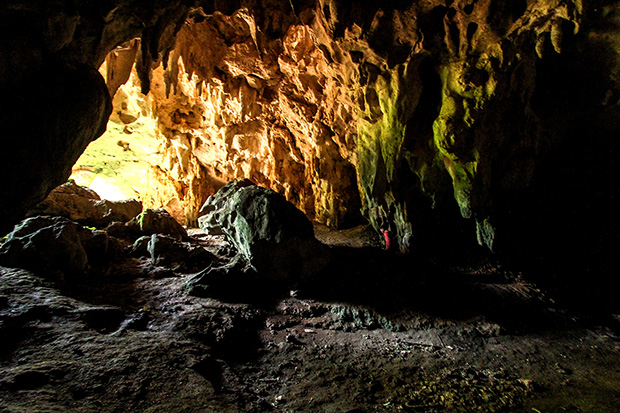GENERAL SANTOS CITY (MindaNews / 14 May) – The Department of Environment and Natural Resources (DENR) in Region 12 is pushing for the development of six caves in the region as alternative ecotourism sites.
 ECOTOURISM POTENTIAL. Inside the Lope Cave in Barangay Pisan, Kabacan, North Cotabato. File photo taken 26 January 2014. The DENR is pushing to develop caves in Region 12 for ecotourism. MindaNews photo by Keith Bacongco
ECOTOURISM POTENTIAL. Inside the Lope Cave in Barangay Pisan, Kabacan, North Cotabato. File photo taken 26 January 2014. The DENR is pushing to develop caves in Region 12 for ecotourism. MindaNews photo by Keith Bacongco
Datu Tungko Saikol, DENR Region 12 executive director, said they are currently eyeing potential investments that would facilitate the establishment of caving-related facilities in six caves in the region that were recently declared by the DENR central office as “open to ecotourism activities.”
He said such declaration was provided for in Memorandum Circular No. 2014-03 issued last month by Environment Secretary Ramon Paje.
The memorandum specifically classified four caves in the area as Class II and two others as Class III formations.
Republic Act (RA) 9072 or the National Caves and Cave Resources Management and Protection Act identified Class II caves as those with portions that have hazardous conditions and are open to experienced cavers or guided educational visits.
Class III caves are formations that are considered unthreatened and are safe to inexperienced visitors but should still be accompanied by cave guides.
It said the caves may also be utilized for economic purposes such as guano extraction and edible birds nest collection.
The declared Class II caves were the Kofnit Cave in Lake Sebu, South Cotabato; Tenobak Cave in Lebak, Sultan Kudarat; Linao Cave in Maitum, Sarangani; and the Cathedral and Avenue Caves in Kabacan, North Cotabato.
Those identified as Class III were the Malibato Cave in T’boli, South Cotabato and the Lupi (Lope) Cave in Kabacan, North Cotabato.
Saikol said the classification of the six caves was based on an earlier recommendation issued by the National Cave Committee.
The committee, in coordination with the DENR-12, had conducted assessments on the status of the said caves.
Citing provisions of the memorandum, the official said that while the six caves were declared open to ecotourism activities, they must be under the guidance and supervision of the agency.
He said Paje directed them to immediately prepare management plans for each of the caves, focusing on ecotourism, scientific, educational and economic activities.
The official said they consider the classification of the six caves as a big boost to the thriving ecotourism sector of the region.
He said they expect the move to also lead to the assessment and classification of other caves situated in the region.
“All geological formations in the region should be properly classified so that conservation and protection measures could be implemented appropriately,” he said.
Saikol cited that the agency has not yet documented all existing caves in the region, specifically those located in remote mountainous areas.
He urged local government units in the region to take the lead in the documentation and the assessment of their own caves.
He said the DENR-12 can provide technical assistance to such activities through its protected areas, wildlife and coastal zone management service unit.
